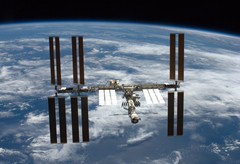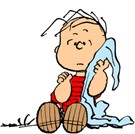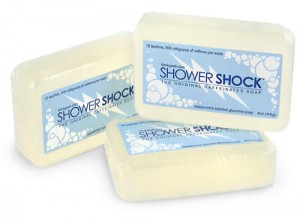This post is the first in a series of ten about my experiences at Clarion West Writers Workshop in 2008. Clarion West is an intense six-week writers’ workshop held at a mysterious space station in geosynchronous orbit above Seattle. Writers live in the station over the course of the workshop. 
My year Paul Park, Mary Rosenblum, Cory Doctorow, Connie Willis, Sheree R. Thomas, and Chuck Palahniuk instructed. I’ll post two entries (counting this post) for just before Clarion West, one for each of the six weeks I spent there, and two for just after what turned out to be the best experience of my life (so far!).
During my final semester at my alma mater, TCU, one of my profs, Neil Easterbrook, handed me a flier for Clarion West. He knew I’d taken creative writing classes and that I enjoyed speculative fiction (a vague umbrella term for science fiction, fantasy, horror, etc. — whatever those labels mean). I’d heard of the Clarion West Writers Workshops — there’s three: East (San Diego), West (Seattle), and South (Brisbane) — from the Web and from Orson Scott Card’s How to Write Science Fiction and Fantasy. Card writes that a Clarion workshop:
isn’t for fragile people. It’s a tough experience […] If you’re just starting out and completely uncertain of your identity as a writer, Clarion can be the end, not the beginning. But if you know you’re a writer, […] apply to Clarion.
Well, I knew I was a writer, but I was also timid. I’d written fiction for only two years, and only completed about ten short stories! How the heck could I complete a short story every week for six weeks? And possibly more, depending on the instructors? Not to mention I was unaccustomed to travel. How could I manage six weeks in a space station with writers undoubtedly more talented than I?
Neil encouraged me, as did Cynthia Shearer. (Which goes to show the importance of surrounding yourself with good, positive people.) So I carved a 29-page short story out of novel-in-progress; application manuscripts couldn’t go over 30 pages. I don’t believe I slept the last 48 hours before the deadline. Revising, revising, revising. I emailed my application off at the last minute.
 For future applicants’ reference: my application story had no speculative elements. During our workshop, a few people did write some non-speculative stories.
For future applicants’ reference: my application story had no speculative elements. During our workshop, a few people did write some non-speculative stories.
What do you know: in March I received The Call — Clarion West notifies successful applicants by phone. At first I figured The Call was actually A Prank Call. Once I realized it wasn’t, I calmly explained I’d jump up and down after shock wore off. =p
Over the next three months, my nerves popped away. My biggest anxiety: six-plus stories, six weeks, how?! The info packet said we couldn’t bring trunk stories. Rightfully so. For one, the no-trunk-stories policy makes everyone equally anxious! =p
So what jottings could I take with me without taking a “trunk story”? The info packet suggested we bring “images, titles, notes” (something like that). After much unnecessary consternation, I decided a few rough paragraphs counted as “notes.”  I needed a security blanket, and I made one out of words — about 1000 of them, not many of which went into my final Clarion West word count, which was something like 25,000.
I needed a security blanket, and I made one out of words — about 1000 of them, not many of which went into my final Clarion West word count, which was something like 25,000.
I made a wise decision (for me) before I left. In the “advice from former students” section of the packet, some blessed soul said (something like) “Don’t feel pressured to do the six-stories-in-six-weeks thing if it’s not for you.” I knew I couldn’t write a coherent short story in a week (at that stage in my life), so I didn’t. Not counting Paul Park’s exercises, I wrote a total of three stories, each spaced out by two weeks. And by the time the workshop was through, each instructor had read at least one of my works. My plan worked out fine. Future Clarionites, feel free to follow it if it serves ye well.
With my writing worries sorted out, I then packed a bajillion suitcases with the help of my now-girlfriend, and blasted off to the space station.
This post is the first in a series of ten about my experiences at Clarion West Writers Workshop in 2008. Clarion West is an intense six-week writers’ workshop held at...
 I eliminated all caffeine from my diet last month. The month or so before, I drank it regularly in the morning — usually via a caffeinated smoothie and an energy drink — and throughout the day. I’d have the occasional caffeinated soft drink and the occasional caffeinated whatnot. Caffeinated caffeinated caffeinated. My world depended on it, subtly but surely. Now I preach the evangel of quitting caffeine to you.
I eliminated all caffeine from my diet last month. The month or so before, I drank it regularly in the morning — usually via a caffeinated smoothie and an energy drink — and throughout the day. I’d have the occasional caffeinated soft drink and the occasional caffeinated whatnot. Caffeinated caffeinated caffeinated. My world depended on it, subtly but surely. Now I preach the evangel of quitting caffeine to you.
After giving up caffeine, I no longer have to worry so much about wiping out grogginess or appeasing headaches. No more rushing to the refrigerator or Starbucks or a gas station. I have much more energy. I get by fairly well on 6-7 hours of sleep a night instead of slogging through the day on 8-9. My mood stays more consistent, too.
Since caffeine is addictive, quitting it sucks. Temporary symptoms of caffeine withdrawal can include the infamous headache, irritability, nausea, sleeping a lot (your body finally catching up), and becoming just plain stupid (impairment in various cognitive skills, such as fuzzified concentration). I experienced all of these except nausea and stupidity — I am never stupid, because like Wile E. Coyote, I am a Super Genius.
I found caffeine withdrawal slightly difficult, but manageable. John Hopkins University maintains a fact-filled page on caffeine dependence. They say withdrawal takes 12-24 hours to set in — and it can set in even if you drink only a cup of coffee a day. Happened to me after about 16 hours. According to the page, symptoms peak 20-48 hours after abstinence. My symptoms peaked around day two and three. Caffeine withdrawal lasts a total of two days to one week or more, the page reports; for me, withdrawal lasted nine days. Your mileage may vary.
In the interest of complete transparency, I must admit that one day I forgot — really! — that chocolate contains caffeine, and ate a tiny bit; the effect was negligible, so I discount the incident entirely. (I guess for a split second I wasn’t a Super Genius.) You really have to pay attention to everything you consume (a good idea anyway), because just about everything has caffeine in it, including mate, guarana, and decaf coffee. If you drink a pot of decaf, there’s enough caffeine in there for you to notice.

Why should you quit caffeine? After all, some studies link caffeine to certain health benefits. For me, it’s about the energy boost: imagine spending more time enjoying what you want to do instead of feeling miserable and dependent on lugging around your latte or Diet Coke or whatever particular poison. What are you going to do if you go on a camping trip? Pop NoDoz?
Poison, ayup, and not that fun of one. Caffeine interferes with sleep by reducing total sleep time, making it harder to fall asleep, and decreasing sleep quality. To be fair, a sleep researcher named Dr. Dement — the coolest name for a scientist — argues in The Promise of Sleep a bit of coffee before noon won’t affect a night bedtime. Still, Mark Adams at New York Magazine writes (early 2008):
The United States Centers for Disease Control reports that sleep disorders are more pervasive than ever. Americans, on average, are getting 6.7 hours of sleep per night, the lowest amount since records have been kept, and are racking up an hour or more of sleep deficit per day. Sales of Ambien, Lunesta, and other prescription sleep aids have more than doubled in the past few years. “You have people drinking caffeine all day and taking sleeping pills at night,” [Laura] Juliano says[, American University psych professor and coffee researcher].
Sleep loss causes its own problems, Adams continues:
Sleep loss is increasingly seen as a major factor in the obesity epidemic. The sleep-deprived are more susceptible to depression and tend to have less control over their emotions. Sleep loss also weakens problem-solving and decision-making skills and, naturally, leaves a sufferer exhausted—all of which are conditions that caffeine is called upon to solve. “If we drink coffee all day long, it’s harder to sleep at night, and we need more coffee to get up and go to work the next morning,” says Lane. “The cycle repeats itself.”
Juliano and Roland Griffiths, a professor of psychiatry and neuroscience at Johns Hopkins, argue caffeine’s alleged benefits might be illusory. Quoting Adams again:
The escape from the clutches of withdrawal is a big part of what makes the day’s first cup of coffee so wonderful. “Feeding that dependence feels really good,” Juliano says. The implication: The positive feelings we associate with drinking coffee don’t represent a net gain in energy or alertness; they’re really the result of withdrawal maintenance.
When Griffiths and Juliano teamed up to review 170 years of caffeine research, much of which confirmed the drug’s reputation as a brain booster, they noticed a pattern: Most studies had been done on caffeine users who, in the interest of scientific rigor, were deprived of the stimulant overnight. Because caffeine withdrawal can commence in just twelve hours, by the time each study’s jonesing test subjects were given either caffeine or a placebo, they had begun to suffer headaches and fatigue. For the half that received the stimulant—poof!—their withdrawal symptoms vanished. The other half remained uncaffeinated, crabby, and logy, and guess which group scored higher on cognitive tests time after time? The boost the test subjects who got the caffeine felt may have simply been a function of having been deprived of the drug.
And a neat formulation from Adams’s article by James Lane at Duke: while caffeine can keep us awake, “it doesn’t make the brain any less tired.”
 Clearly many of us are hooked on caffeine, so it makes sense for companies to add it to products to addict us. If you want to increase your dependence on caffeine, you can always absorb it through your skin first thing out of bed with Shower Shock: The Original Caffeinated Soap or Spazzstick: The World’s First Caffeinated Lip Balm. If that’s still not enough, wear caffeine-laced panty hose (link is to a .pdf with a description; no pic, unfortunately). I’m not making these up.
Clearly many of us are hooked on caffeine, so it makes sense for companies to add it to products to addict us. If you want to increase your dependence on caffeine, you can always absorb it through your skin first thing out of bed with Shower Shock: The Original Caffeinated Soap or Spazzstick: The World’s First Caffeinated Lip Balm. If that’s still not enough, wear caffeine-laced panty hose (link is to a .pdf with a description; no pic, unfortunately). I’m not making these up.
I still plan on increasing my energy level in other ways. For this month’s science experiment, I’ll drink only water: no alcohol, no Gatorade, and sadly, no orange juice. I don’t really expect much of a benefit in terms of increased energy — just in terms of fat loss — although some, such as Rob of formerfatguy.com, sings water’s praises for doing everything from increasing energy to aiding digestion. Others say toting around water bottles isn’t necessary. We’ll see.
If you want to quit caffeine, wean yourself off, or be bold and quit cold turkey. Improve your discipline! Establish a healthy habit! Check out Steve Pavlina’s how to quit caffeine for advice.
If you don’t want to quit, at least be festive about your coffee, like these folks on YouTube, who sing and dance JS Bach’s “Coffee Cantata” (BMV 211), a comic cantata composed in 1734. (Incidentally, JS Bach is one of my favorite composers.) One line from the piece: “If I can’t drink my bowl of coffee three times daily, then in my torment I will shrivel up like a piece of roast goat.” Be braver than that person! ;-)
I eliminated all caffeine from my diet last month. The month or so before, I drank it regularly in the morning — usually via a caffeinated smoothie and an energy...

 For future applicants’ reference: my application story had no speculative elements. During our workshop, a few people did write some non-speculative stories.
For future applicants’ reference: my application story had no speculative elements. During our workshop, a few people did write some non-speculative stories. I needed a security blanket, and I made one out of words — about 1000 of them, not many of which went into my final Clarion West word count, which was something like 25,000.
I needed a security blanket, and I made one out of words — about 1000 of them, not many of which went into my final Clarion West word count, which was something like 25,000.


 Twitter:
Twitter:
Join the conversation